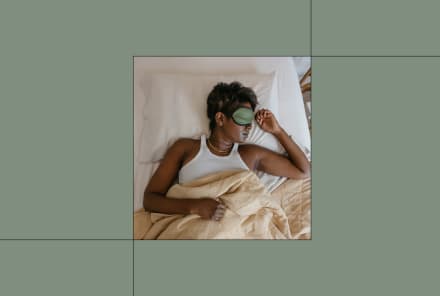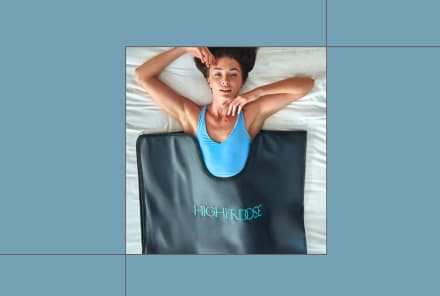Advertisement
This Is The Optimal Cold Plunge Temp For Women (Yes, It's Different)

Hannah Frye is the Assistant Beauty Editor at mindbodygreen. She has a B.S. in journalism and a minor in women’s, gender, and queer studies from California Polytechnic State University, San Luis Obispo. Hannah has written across lifestyle sections including health, wellness, sustainability, personal development, and more.

Exercise physiologist and nutrition scientist Stacy Sims, Ph.D., is transforming how people think about women's health. From calling out the stark gender gap in medical research to setting the record straight on postmenopause workout plans, Sims is determined to help women optimize their health by dissecting some of the buzziest longevity topics around.
Also on the list of nuanced habits she covered on the mindbodygreen podcast is cold plunging. To come, a not-so-known tip for any woman looking to embrace cold therapy.
The best cold plunge temperature for women
Fun fact: The dip in frigid water itself isn't why polar plunges are so good for you. In fact, the bulk of the benefits come from your body warming itself back up post-dip (also known as thermogenesis1), which is why the water needs to be cold enough to ensure your body feels the chill—but for women, that benchmark might be warmer than you think.
"When we look at the temperature gradient of when women start to shiver or when women start to feel cold, it's around 16 degrees Celsius, or about 55 [to] 56 degrees Fahrenheit water," Sims explains.
She adds that when we look at when women start to experience shivering effects, "it's not as cold for women as it is for men2." To put it simply: Women are physically more sensitive to cold temperatures3. The general recommendation for cold plunge temperatures is between 50 and 60 degrees, but women don't have to get close to the 50-degree mark to experience the benefits, she claims.
Still, post-exercise cold plunge therapy may be even more beneficial for women than men. Why? "Post-exercise, women vasodilate4, so all of the blood goes to their periphery away from the heart. [This] is why some women feel really lightheaded after exercise," she notes. "So women should get in cool water to create vasoconstriction [and] send that blood back centrally to enhance recovery."
Pretty interesting, right? Sims rounds out the conversation by suggesting women participate in a few plunges each week for general health, with more specific schedules if you have a specific physical training goal. The reason for the latter is that your body needs some level of inflammation to adapt to physical training, and frequent plunges may eliminate inflammatory responses too much (for training purposes, that is).
RELATED READ: We Found the Best Cold Plunge Tub at Every Price Point
Other must-have tips
Ready to take a dip? Before you do, consider these extra tips for your best plunge:
- End on cold: As we mentioned, the benefits come from your body warming itself up after the plunge, so don't cut that process short by hopping in a warm shower or sauna right afterward. You can certainly start with a warm environment, or go back and forth, but always end on cold.
- Start slow: You shouldn't hop in a cold plunge tub for a full five minutes on your first go-around. Begin with shorter durations (think one or two minutes) and work your way up as your body gets used to the chill. As a general rule, keep your session between three and five minutes for general use.
- Listen to your body: While cold plunging is inherently slightly uncomfortable, you shouldn't push your body to stay in the water longer or cold plunge more often than desired. Some folks prefer to stick with this habit daily, others every few days, and some just on occasion—so listen to your body and do what feels right for you.
The takeaway
Cold plunging is a worthy recovery-enhancing practice after a workout (for everyone), but Sims recommends women keep the water temperature between 55 and 56 degrees Fahrenheit. Great news for those sensitive to the cold! For more research-backed tips specific to women's health, tune into the full podcast episode below:
Watch Next
Enjoy some of our favorite clips from classes
Enjoy some of our favorite clips from classes
What Is Meditation?
Mindfulness/Spirituality | Light Watkins
Box Breathing
Mindfulness/Spirituality | Gwen Dittmar
What Breathwork Can Address
Mindfulness/Spirituality | Gwen Dittmar
The 8 Limbs of Yoga - What is Asana?
Yoga | Caley Alyssa
Two Standing Postures to Open Up Tight Hips
Yoga | Caley Alyssa
How Plants Can Optimize Athletic Performance
Nutrition | Rich Roll
What to Eat Before a Workout
Nutrition | Rich Roll
How Ayurveda Helps Us Navigate Modern Life
Nutrition | Sahara Rose
Messages About Love & Relationships
Love & Relationships | Esther Perel
Love Languages
Love & Relationships | Esther Perel
What Is Meditation?
Box Breathing
What Breathwork Can Address
The 8 Limbs of Yoga - What is Asana?
Two Standing Postures to Open Up Tight Hips
How Plants Can Optimize Athletic Performance
What to Eat Before a Workout
How Ayurveda Helps Us Navigate Modern Life
Messages About Love & Relationships
Love Languages
Advertisement

This Little-Known Supplement Helps Women Sleep & Decreases Signs Of Depression
Molly Knudsen, M.S., RDN

This Little-Known Supplement Helps Women Sleep & Decreases Signs Of Depression
Molly Knudsen, M.S., RDN















